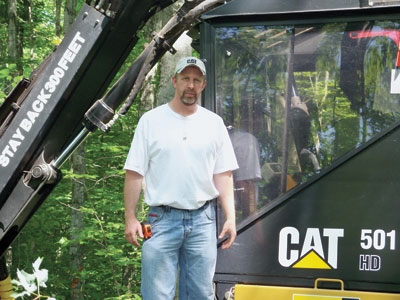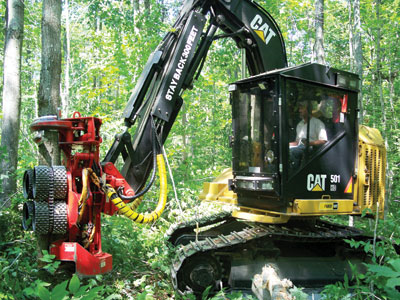
New Gear
Harvesting
New Gear
City Boy Turns Logger
Al Falewitch was a city boy born in Chicago. He didn’t grow up in the business, and never touched a chainsaw until he was 19 years old. Yet at 40 he is a successful logger in Marquette, just over the Ontario border in Michigan’s Upper Peninsula (UP), subcontracting for J.M. Longyear LLC.
November 21, 2011 By Connie Ness
 Al Falewitch reports that his Cat 501HD harvester has proven itself in productivity Al Falewitch was a city boy born in Chicago. He didn’t grow up in the business
Al Falewitch reports that his Cat 501HD harvester has proven itself in productivity Al Falewitch was a city boy born in Chicago. He didn’t grow up in the businessAfter a two-year program studying heavy equipment, maintenance and business, he started out 19 years ago working by himself with a chainsaw and pole skidder. Eventually, he hired help, but employee problems and workers’ comp issues caused him to go back to a one-man operation in the woods, with his wife handling the administrative duties.
Now Falewitch just cuts. In May 2007, he traded in his Fabtek FT153 tracked harvester for a new Cat 501HD track harvester, bought and financed through FABCO, a Cat dealer in Wisconsin and Upper Michigan. He was its first customer for the Cat track harvester, but that has not been an issue.
“They have been excellent. The support has been way above what I imagined it would be. I get calls all the time from the forestry specialist and the Marquette branch manager to make sure the machine is running okay,” Falewitch says. “We’ve had bugs – you are going to have bugs in any machine – and they take care of them right away. I’ve never been taken care of like I have been by Cat.”
After 425 hours and 3,000 cords (6,000 m3), Falewitch reports the Cat harvester has definitely proven itself. He cuts in selective hardwood 90% of the time, and describes the Cat 501HD as a machine purpose-built for hardwood cutting that takes care of the stand.
“In selective cut hardwoods this machine fits, because the width of the tracks is about six inches smaller than other harvesters,” he explains. “That little difference makes a big difference as far as root damage and other issues with a track machine. The Cat machine turns inside the tracks, which means I’m not going to bump into trees.”
The harvester also does well grabbing, holding and controlling even a 20-in diameter maple. “I can go through the other limbs in the stand as light as a feather and bring that tree all the way down to the ground with minimal damage. This is important, because we try to treat every land we cut as if it were our own.”
By the Numbers
Falewitch describes himself as a numbers guy, and he can tell you what everything costs down to the fraction, including fuel. The Cat harvester is running 16.1 l/hr of diesel (4.25 gal/hr in the region’s relatively flat and gentle terrain, or 1.15 l/m3 (0.6 gal/cord).
“The reversible fan automatically blows out any debris in the radiator and keeps the engine at a constant 178 degrees (F). The engine never has a chance to heat up and burn more fuel, so I am always running 100% economically,” he says. From talking to other track operators about the fuel they go through, he is confident the fuel economy he is getting with his harvester is impressive.
After productivity, durability is the next consideration. Falewitch’s Fabtek FT153 had 6,200 hours when he traded it in. The Cat 501HD is the upgraded version of the FT153. (The Fabtek brand name has been retired).

“The Fabtek was three and a half years old when I traded it in, and there are no weld marks on it. The durability and dependability was there. Even cutting big hardwood, it did a great job, so I know the next generation of that harvester will do the same.”
Falewitch calls the 501HD operator-friendly and simple to run. He cites the computer’s autoseek function as an example. “With some other machines, you would have to hold the button to make the tree come through and go to your selected length. With this, you just push the button and let it go. If it happens to go too far, it will automatically bring itself back to your selected length,” he explains.
Contracted Uptime
The harvester gets the job done, and with a Customer Service Agreement (CSA), Falewitch can spend more time with his family. The dealer, FABCO, handles all scheduled maintenance, other than daily servicing, something made possible by relatively close and good forest access by Canadian standards. “We do all maintenance on site at night or on weekends. Customers can go home, and when they come back the next morning, their machine is all ready to go,” explains FABCO area sales manager Sparky Enstrom.
When he bought the harvester, Falewitch says he was hoping to produce enough so he could spend more time with his wife, Denise, and their four children. “It has come to that. I cut out at half a day on Fridays — or sometimes I take Fridays off. I give them a call and tell them we are ready for a service call. I don’t have to be there,” he says. “I bought the machine May 9th and I’ve already taken a week’s vacation, the first one in two years.”
Enstrom points out that when customers analyze their true costs of doing the maintenance themselves, the CSA actually works out to be a better deal. “We give a guarantee on parts and labour pricing for the life of the contract. Also, our guys are experts so what might take the logger four hours to do, we can do in three,” he says.
Falewitch agrees. “When you calculate the actual cost, it’s not that great. It is worthwhile knowing the machine is ready to go all the time and everything is documented. I am very meticulous with my equipment, but you can get overwhelmed with work, and not do everything you should do to the equipment.”
FABCO has had over 2,000 machines in the CSA program over the last five years. “It’s such a good program, we even do competitive machines,” Enstrom adds. Todd Gustafson, FABCO forestry product specialist, says the CSA is one piece of what he calls FABCO’s “one-stop shop” service. “We can take care of
the logger’s financing, service, parts, sales of their machines and Cat engines in their log trucks, too.”
Falewitch is a success story in an industry where many are struggling. How does he do it? He focuses on what he does best, uses the right gear for the job, and works for the best. Falewitch gives much of the credit to his contractor, J.M. Longyear. “They take good care of us. They keep us working year round. We don’t have the ups and downs that other loggers have.”
He is teamed up with another independent contractor, Keith Dob-bratz, who owns and operates a forwarder that carries out Falewitch’s wood. “We’re an independent team that works well together,” he says. “And we don’t have to worry about the details. Everything is ready when we get on site. The roads are in; the truckers are ready. We go in there, slam the wood out, stick it on the landing, and go to our next job.”
Simple is often best.
Print this page